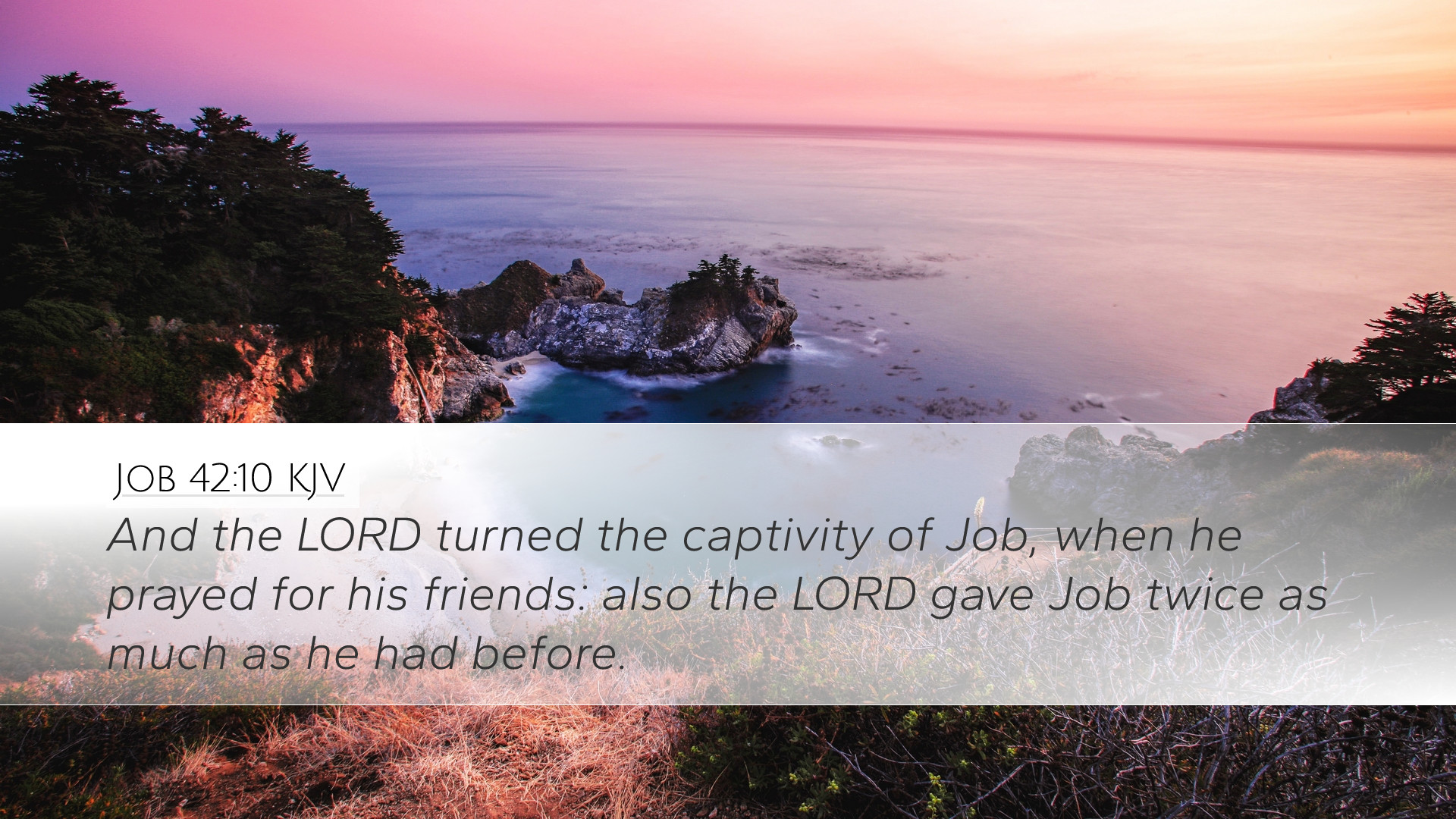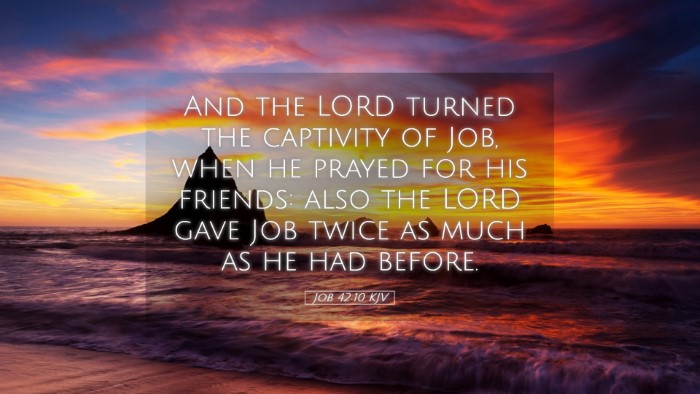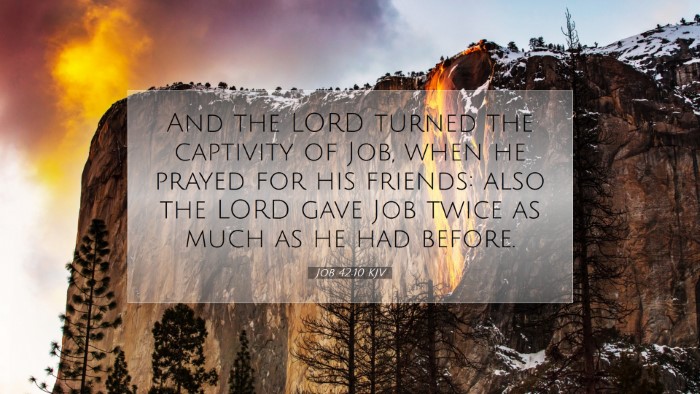Old Testament
Genesis Exodus Leviticus Numbers Deuteronomy Joshua Judges Ruth 1 Samuel 2 Samuel 1 Kings 2 Kings 1 Chronicles 2 Chronicles Ezra Nehemiah Esther Job Psalms Proverbs Ecclesiastes Song of Solomon Isaiah Jeremiah Lamentations Ezekiel Daniel Hosea Joel Amos Obadiah Jonah Micah Nahum Habakkuk Zephaniah Haggai Zechariah MalachiJob 42:10
Job 42:10 KJV
And the LORD turned the captivity of Job, when he prayed for his friends: also the LORD gave Job twice as much as he had before.
Job 42:10 Bible Commentary
Commentary on Job 42:10
Verse Context: Job 42:10 reads: "And the Lord turned the captivity of Job, when he prayed for his friends: also the Lord gave Job twice as much as he had before." This verse encapsulates the pivotal moment of restoration in Job's life, following his period of immense suffering and testing.
Overview of Job's Trials
The Book of Job addresses the profound themes of suffering, faith, and divine justice. Job, described as blameless and upright, faced catastrophic losses and physical affliction, leading to a profound dialogue between himself, his friends, and God. His predicament raises questions about the nature of righteousness and the role of divine sovereignty.
Significant Observations
- The Restoration After Prayer: Job's restoration is intricately linked to his act of intercession for his friends. This reflects the principle that forgiving and praying for others can lead to personal healing and restoration.
- Divine Generosity: God’s doubling of Job’s riches serves as a testament to His abundant grace. It illustrates that divine restoration often exceeds human understanding and expectation.
Insights from Commentaries
Matthew Henry's Commentary
Matthew Henry emphasizes the importance of prayer in Job's restoration. He notes, “Job's afflictions were heavy, but his prayer was powerful. The beauty of the prayer lies in its nature; he prayed for those who had wronged and blamed him.” This highlights the theme of selflessness in prayer and intercession as a pathway to receiving divine favor.
Henry further states that Job's fortunes were restored not merely as a reward for his faithfulness but as a testimony to the power of forgiveness and reconciliation. He stresses that Job's journey from anguish to restoration reveals God’s merciful nature and His desire to restore broken lives.
Albert Barnes' Commentary
Albert Barnes asserts that Job’s act of praying for his friends signifies his reconciliation with God, indicating an acknowledgment of God’s justice. Barnes articulates, “The main object of Job was to see God’s hand in his troubles, and therefore, when he received this answer after prayer, it was a sign that he had found favor in the eyes of God.” This notion reassures believers about the transformative power of sincere prayer amid trials.
Furthermore, Barnes points out that this restoration serves as a reminder of the hope believers have in God’s deliverance. He encourages the faithful to comprehend that trials can indeed lead to greater blessings in the hands of a benevolent God.
Adam Clarke's Commentary
Adam Clarke references the theological implications of Job's restoration. He writes, “God’s restoration of Job after he prayed for his friends is a divine principle; that in humility and love towards our brethren, especially those who criticize us, we will find favor with God.” This perspective underscores the connection between one’s relationship with God and one’s relationship with others.
Clarke also notes the doubling of Job’s possessions as a prophetic sign of the ultimate restoration believers can find through Christ. He calls attention to the eschatological implications of this restoration, suggesting that believers can look forward to an even greater recompense in eternal life.
Applications for Today's Believers
- Intercessory Prayer: This verse encourages believers to engage in intercessory prayer, reminding them of the power it has not only for others but for their own restoration.
- Forgiveness: Job's ability to forgive those who had wronged him points to a key trait in our spiritual walk—extending grace even when it is undeserved.
- Hope in Suffering: The narrative serves as a robust reminder that suffering may precede restoration and that God’s plans for His people can lead to greater blessings than initially known.
- Understanding Divine Justice: This passage invites reflection on the nature of God's justice and grace; believers are reassured that God sees their trials and hears their pleas.
Conclusion
Job 42:10 serves as a profound testament to the nature of God’s transformative power in the lives of those who suffer. The interplay of prayer, forgiveness, and divine restoration painted in this verse is essential for pastors, students, and theologians alike. As they delve deeper into the text and its commentary, they will uncover layers of meaning that continue to speak to the trials and triumphs of the Christian faith.


